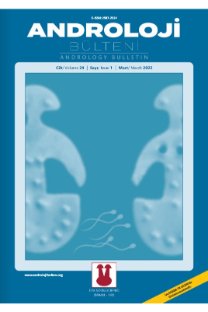İdiopatik hipogonadotropik hipogonadizm nedenlierkek infertilitesinde gonadotropin tedavisinindeğerlendirilmesi
AMAÇ: İdiopatik hipogonadotropik hipogonadizm (IHH) tanısı konu lan infertil erkeklerde human koryonik gonadotropin (hCG)/humanmenopozal gonadotropin (hMG) tedavisinin etkinliğini ve klinik so nuçlarını değerlendirmek. GEREÇ ve YÖNTEMLER: Ocak 2017 – Aralık 2018 tarihleri arasındaIHH tanısı konulan 60 hastanın tedavi öncesi ve sonrası verileri ret rospektif olarak incelendi. Hastalar gebelik elde edilen ve edilemeyenlerolarak iki gruba ayrılarak yaş, vücut kitle indeksi (VKI), testis hacimle ri, tedavi sonrası saptanan maksimum serum total testosteron, folikülstimüle edici hormon (FSH) ve lüteinleştirici hormon (LH) değeri iletedavide uygulanan ortalama hCG ve hMG dozları ve sperm konsant rasyonları karşılaştırıldı. BULGULAR: Tedavi sonrası 3. ve 6. ayda hormonal parametreler ve testisvolümünde anlamlı düzelme saptandı (p
Evaluation of gonadotropin therapy in male infertility caused by idiopathic hypogonadotropic hypogonadism
OBJECTIVE: To evaluate the efficacy and clinical results of humanchorionic gonadotropin (hCG)/human menopausal gonadotropin(hMG) treatment in infertile men diagnosed with idiopathichypogonadotropic hypogonadism (IHH). MATERIAL and METHODS: The pre and post treatment data of 60patients diagnosed with IHH between January 2017 and December2018 were retrospectively analyzed. The patients were divided intotwo groups as those with or without pregnancy. Age, body mass index(BMI), testicular volumes, maximum serum total testosterone, folliclestimulating hormone (FSH) and luteinizing hormone (LH) valuesmeasured after treatment, and mean hCG and hMG doses and spermconcentrations were compared. RESULTS: After the treatment, there was a significant improvement inhormonal parameters and testicular volume (p
___
- 1. Nieschlag E, Behre HM, Nieschlag S, editors. Andrology – Male Reproductive Health and Dysfunction. Berlin Heidelberg: Springer-Verlag; 2010. [CrossRef]
- 2. Prior M, Stewart J, McEleny K, Dwyer AA, Quinton R. Fertility induction in hypogonadotropic hypogonadal men. Clin Endocrinol 2018;89:712–8. [CrossRef]
- 3. Zitzmann M, Nieschlag E. Hormone substitution in male hypogonadism. Mol Cell Endocrinol 2000;161:73–88. [CrossRef]
- 4. Akdeniz E, Açıkgöz A, Erdemir F. Erkek infertilitesinin medikal yönetimi. Androl Bul 2021;23:37−46. [CrossRef]
- 5. Bauman WA, La Fountaine MF, Cirnigliaro CM, Kirshblum SC, Spungen AM. Testicular responses to hCG stimulation at varying doses in men with spinal cord injury. Spinal Cord 2017;55:659– 63. [CrossRef]
- 6. Warne DW, Decosterd G, Okada H, Yano Y, Koide N, Howles CM. A combined analysis of data to identify predictive factors for spermatogenesis in men with hypogonadotropic hypogonadism treated with recombinant human follicle-stimulating hormone and human chorionic gonadotropin. Fertil Steril 2009;92:594–604. [CrossRef]
- 7. Kohn TP, Louis MR, Pickett SM, Lindgren MC, Kohn JR, Pastuszak AW, Lipshultz LI. Age and duration of testosterone therapy predict time to return of sperm count after human chorionic gonadotropin therapy. Fertil Steril 2017;107:351–7.e1. [CrossRef]
- 8. La Vignera S, Condorelli RA, Duca Y, Mongioi LM, Cannarella R, Giacone F, Calogero AE. FSH therapy for idiopathic male infertility: four schemes are better than one. Aging Male 2019;23:750–5. [CrossRef]
- 9. Farhat R, Al-zidjali F, Alzahrani AS. Outcome of gonadotropin therapy for male infertility due to hypogonadotrophic hypogonadism. Pituitary 2010;13:105–10. [CrossRef]
- 10. Liu Z, Mao J, Wu X, Xu H, Wang X, Huang B, et al. Efficacy and outcome predictors of gonadotropin treatment for male congenital hypogonadotropic hypogonadism: a retrospective study of 223 patients. Medicine 2016;95:e2867. [CrossRef]
- 11. Wenker EP, Dupree JM, Langille GM, Kovac J, Ramasamy R, Lamb D, et al. The use of HCG‐based combination therapy for recovery of spermatogenesis after testosterone use. J Sex Med 2015;12:1334–7. [CrossRef]
- 12. Rastrelli G, Corona G, Mannucci E, Maggi M. Factors affecting spermatogenesis upon gonadotropin‐replacement therapy: a meta‐ analytic study. Andrology 2014;2:794–808. [CrossRef]
- 13. European Metrodin HP Study Group. Efficacy and safety of highly purified urinary follicle-stimulating hormone with human chorionic gonadotropin for treating men with isolated hypogonadotropic hypogonadism. Fertil Steril 1998;70:256–62. [CrossRef]
- 14. Dwyer AA, Raivio T, Pitteloud N. Gonadotrophin replacement for induction of fertility in hypogonadal men. Best Pract Res Clin Endocrinol Metab 2015;29:91–103. [CrossRef]
- 15. Vicari E, Mongioi A, Calogero A, Moncada ML, Sidoti G, Polosa P, D’Agata R. Therapy with human chorionic gonadotrophin alone induces spermatogenesis in men with isolated hypogonadotrophic hypogonadism‐long‐term follow‐up. Int J Androl 1992;15:320–9. [CrossRef]
- 16. Burris AS, Rodbard HW, Winters SJ, Sherins RJ. Gonadotropin therapy in men with isolated hypogonadotropic hypogonadism: the response to human chorionic gonadotropin is predicted by initial testicular size. J Clin Endocrinol Metab 1988;66:1144–51. [CrossRef]
- 17. Ortac M, Hidir M, Salabas E, Boyuk A, Bese C, Pazir Y, Kadioglu A. Evaluation of gonadotropin-replacement therapy in male patients with hypogonadotropic hypogonadism. Asian J Androl 2019;21:623. [CrossRef]
- 18. Dwyer AA, Sykiotis GP, Hayes FJ, Boepple PA, Lee H, Loughlin KR, et al. Trial of recombinant follicle-stimulating hormone pretreatment for GnRH-induced fertility in patients with congenital hypogonadotropic hypogonadism. J Clin Endocrinol Metab 2013;98:E1790–5. [CrossRef]
- 19. Hosseinifar H, Sabbaghian M, Chehrazi M, Modarresi T, Alipour FJ, Gilani MAS. Assessment of deoxyribonucleic acid fragmentation index, testicular volume, semen parameters, and hormone profile in gonadotropin-treated men with hypogonadotropic hypogonadism. Urology 2013;82:1291–5. [CrossRef]
- ISSN: 2587-2524
- Yayın Aralığı: Yılda 4 Sayı
- Başlangıç: 1999
- Yayıncı: Turgay Arık
Sayıdaki Diğer Makaleler
Genç kadınların perspektifinden cinsel sağlık veüreme sağlığında damgalama
Pınar Irmak VURAL, Nazife BAKIR, Cuma DEMİR
Muhammed Arif İBİŞ, Kaan AYDOS
Erkek infertilitesinde tamamlayıcı tıp uygulamaları:Kanıt düzeyi nedir?
Coşkun KAÇAĞAN, Halil Lütfi CANAT
Stomalı hastaların yaşadıkları cinsel sorunlar:Sistematik çalışma
Meme kanseri cerrahisi geçiren kadınların bedenimajı ve cinsel uyumları
Triangulasyon yöntemiyle vazoepididimostomideneyimimiz
Postpartum dönemde cinsel sağlık ve danışmanlık:BETTER modeli kullanımı
Seda ÇETİN AVCI, Zeynep DAŞIKAN
